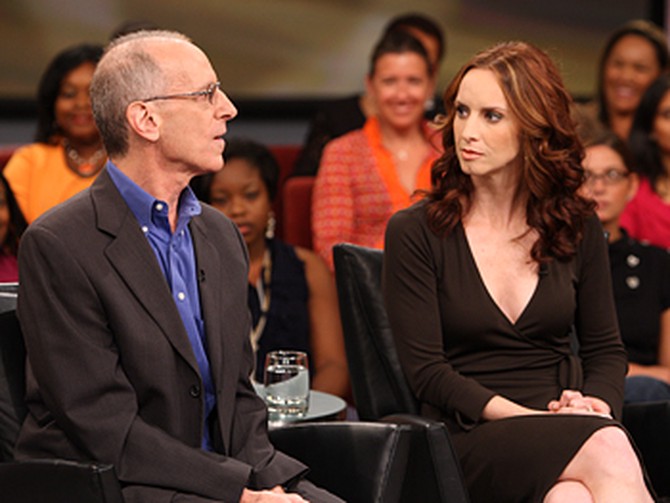Life's Sticky Situations

Not sure how to handle some of life's stickiest situations? We've got an ethics dream team on hand to help solve some of your most puzzling problems.
Faith Salie graduated magna cum laude from Harvard. The Rhodes Scholar is a regular contributor to O, The Oprah Magazine's monthly column Now What Do I Do?, which helps unravel everyday ethical dilemmas.
Since 1998, Randy Cohen has been untangling ethical quandaries in his New York Times Magazine column, The Ethicist.
Faith Salie graduated magna cum laude from Harvard. The Rhodes Scholar is a regular contributor to O, The Oprah Magazine's monthly column Now What Do I Do?, which helps unravel everyday ethical dilemmas.
Since 1998, Randy Cohen has been untangling ethical quandaries in his New York Times Magazine column, The Ethicist.

Mary's situation took place about 15 years ago, but she still wonders what she should have done. "[There were] two different situations where spouses—significant others—of friends of mine propositioned me and I turned them down, but I never told my friends," she says.
Should Mary have told her friends? Randy says no. "When it's a one-time misstep, I would let it go. If there's wine, if there's candlelight, if there's moonlight, we all make mistakes. We're all human," he says. "But if it's a persistent behavior, if someone would do this again, then I think you have to tell. ... I use the sort of guideline 'Once is never; twice is always.'"
Faith says she's shocked at Randy's answer. "I would assume that if those men acted that way toward you," Faith says to Mary, "that's probably not the only time they've acted inappropriately and breached that commitment with their wives."
Should Mary have told her friends? Randy says no. "When it's a one-time misstep, I would let it go. If there's wine, if there's candlelight, if there's moonlight, we all make mistakes. We're all human," he says. "But if it's a persistent behavior, if someone would do this again, then I think you have to tell. ... I use the sort of guideline 'Once is never; twice is always.'"
Faith says she's shocked at Randy's answer. "I would assume that if those men acted that way toward you," Faith says to Mary, "that's probably not the only time they've acted inappropriately and breached that commitment with their wives."

If her husband was cheating, Faith says she'd want to know. "I would say, 'Look, your husband propositioned me. This makes me feel uncomfortable. But more concerning, I'm worried what it means for you.'"
Randy says in talking to your friend, you may be forcing them to admit something they aren't ready to face. "When I took up questions related to this [in my column] ... I found that half the people want to know because they want to know what their spouse is up to. Half don't because they may know and you force them to confront something formally."
Randy says in talking to your friend, you may be forcing them to admit something they aren't ready to face. "When I took up questions related to this [in my column] ... I found that half the people want to know because they want to know what their spouse is up to. Half don't because they may know and you force them to confront something formally."

Michelle faces a delicate dilemma involving her 12-year-old son. Michelle says her son recently met a pretty girl his age. Just as they were about to share a kiss, they got interrupted. The next day, Michelle says the girl texted her son repeatedly and told him she wanted to "go to second base" with him.
Then, Michelle says the girl wrote him offering oral sex and told him she loved him. To make matters worse, news of the girl's text has made it around the neighborhood. "My son was very upset. I was very upset, needless to say. But there was a side of me that said, 'Should I call this 12-year-old girl's mother and let her know what's going on?' Or is it not my place to do that and just deal directly with my son on this matter?" To complicate matters, Michelle says she's never met the girl or her family before.
Then, Michelle says the girl wrote him offering oral sex and told him she loved him. To make matters worse, news of the girl's text has made it around the neighborhood. "My son was very upset. I was very upset, needless to say. But there was a side of me that said, 'Should I call this 12-year-old girl's mother and let her know what's going on?' Or is it not my place to do that and just deal directly with my son on this matter?" To complicate matters, Michelle says she's never met the girl or her family before.

Randy says Michelle absolutely needs to make that call. "When a 12-year-old is involved, it's dangerous. Are they going to have safe sex? The 12-year-old? I think maybe not," he says. "This is when it's our obligation as adults, as members of a community, to make sure our children are not doing anything dangerous."
Faith says Michelle's first priority needs to be preserving her relationship with her son—and calling the girl's mother could embarrass him. "You should be elated as a mom that your 12-year-old son came to you and shared this information," she says. "So I think that this is a perfect opportunity to tell your son, 'Tell that girl that my mom reads my texts so don't write that kind of stuff.'"
Randy adds that the real issue at hand is how you tell, not if you tell. "Let your son know that you're going to do this. You should do it in a way that doesn't embarrass him," he says. "It's wonderful that your son is this open, but I think you can still protect this other child without betraying the trust of your son."
Michelle says she's decided to make that call. The conversation won't be easy, but as long as she has good intentions and is doing this out of love for both children, Faith says she's doing the right thing. "You can only come into it with your best intentions, and you can't control how people react."
Faith says Michelle's first priority needs to be preserving her relationship with her son—and calling the girl's mother could embarrass him. "You should be elated as a mom that your 12-year-old son came to you and shared this information," she says. "So I think that this is a perfect opportunity to tell your son, 'Tell that girl that my mom reads my texts so don't write that kind of stuff.'"
Randy adds that the real issue at hand is how you tell, not if you tell. "Let your son know that you're going to do this. You should do it in a way that doesn't embarrass him," he says. "It's wonderful that your son is this open, but I think you can still protect this other child without betraying the trust of your son."
Michelle says she's decided to make that call. The conversation won't be easy, but as long as she has good intentions and is doing this out of love for both children, Faith says she's doing the right thing. "You can only come into it with your best intentions, and you can't control how people react."

McAulay works in a field where most of her clients and customers are men. "I take them out to lunch and dinner quite frequently, and sometimes these guys can be total pigs. They can make inappropriate comments toward me, toward maybe the waitstaff," she says. "How do I put them in their place and still not lose them as clients?"
Faith says humor should do the trick. "Something that calls attention to the fact that they're acting inappropriately but that you can roll with a joke," she says. "I would also suggest take one of them, maybe the instigator, out of his wolf pack environment and speak to him one-on-one and say, 'Look, Jim, maybe you don't realize this, but your comments sound sexist. And I'm sure you don't mean them to.' And be prepared to give him some specific examples and then, you know, wink and pat him on the butt."
Randy says he doesn't think making jokes will work. "I think if they're being sexist, they're being sexist and your joke isn't going to make them change," he says. "I think you can speak much more directly to people if you do it tactfully. If you do it gently and if you comment on the remark—not the person who made the remark."
Faith says humor should do the trick. "Something that calls attention to the fact that they're acting inappropriately but that you can roll with a joke," she says. "I would also suggest take one of them, maybe the instigator, out of his wolf pack environment and speak to him one-on-one and say, 'Look, Jim, maybe you don't realize this, but your comments sound sexist. And I'm sure you don't mean them to.' And be prepared to give him some specific examples and then, you know, wink and pat him on the butt."
Randy says he doesn't think making jokes will work. "I think if they're being sexist, they're being sexist and your joke isn't going to make them change," he says. "I think you can speak much more directly to people if you do it tactfully. If you do it gently and if you comment on the remark—not the person who made the remark."

McAulay says she doesn't want to be exiled from the boys' club she's worked so hard to get into. "That's why I think if you can handle it with humor, it also takes 'em down a notch and proves that a woman can have a joke at his expense as well," Faith says.
The point, Randy says, isn't to humiliate. "It's to make them a little more sensitive," he says. "You can stick up for yourself. You can have a conversation where you disagree. ... And still treat each other with respect."
The point, Randy says, isn't to humiliate. "It's to make them a little more sensitive," he says. "You can stick up for yourself. You can have a conversation where you disagree. ... And still treat each other with respect."

Kristen is one of the true victims of the Internet age. "I am the queen of accidentally replying to the person that I'm gossiping about in the e-mail," she says. "I've destroyed multiple friendships by doing this. I also have, in one instance, hit 'Reply to All' and sent a company proposal directly to my competitors."
Randy says Kristen has to apologize for what she's already done. "And here's the hard part: You have to mean it," he says. "And you can make amends in some way. You know, sending flowers is not amiss here. You have to demonstrate that you really regret what you did, and you really won't do it again."
He also advises starting to use an underappreciated function in your e-mail program—the 'Drafts' file. "Look at it tomorrow. Reconsider," he says. "It's the e-mail equivalent of counting to 10 before you, you know, punch a guy."
Faith's answer is less technical. "You called yourself the queen. I think you have to decrown yourself," Faith says to Kristen. "You just have to never gossip on e-mail again."
Randy says Kristen has to apologize for what she's already done. "And here's the hard part: You have to mean it," he says. "And you can make amends in some way. You know, sending flowers is not amiss here. You have to demonstrate that you really regret what you did, and you really won't do it again."
He also advises starting to use an underappreciated function in your e-mail program—the 'Drafts' file. "Look at it tomorrow. Reconsider," he says. "It's the e-mail equivalent of counting to 10 before you, you know, punch a guy."
Faith's answer is less technical. "You called yourself the queen. I think you have to decrown yourself," Faith says to Kristen. "You just have to never gossip on e-mail again."

Patti's problem is one that women can relate to. "I've had many girlfriends who have dated the bad boy of the town," she says. "And it comes to the day where they say, 'What do you think of him?' And you say everything that you know they already knew. And I found I've lost many friends because of it. ... I find our friendship fails, they keep the bad boy boyfriend, but I don't see them anymore."
Randy says telling the truth is not always the best policy. "Sometimes when people ask our opinions, they don't want our opinions. What they're really asking for is our praise and our approval," he says. "The right answer is, 'I'm so pleased you're happy.' There's nothing more you can do."
Faith says answering this question is all about framing your answer. "I had a very dear friend who was marrying someone that I didn't think she should marry. And weeks before the wedding, my bridesmaid's dress was bought and I talked to my other friends and we said we need to say something to her," she says. "I said: 'Look, I love you and I want you to be happy. I don't see his behavior making you happy. I hope I'm dead wrong. If you marry him, I will support you. If you divorce him, I will support you. I just couldn't stand for you at your wedding without telling you that I have these doubts about the way he treats you.' ... I felt honest; she felt supported."
Randy says telling the truth is not always the best policy. "Sometimes when people ask our opinions, they don't want our opinions. What they're really asking for is our praise and our approval," he says. "The right answer is, 'I'm so pleased you're happy.' There's nothing more you can do."
Faith says answering this question is all about framing your answer. "I had a very dear friend who was marrying someone that I didn't think she should marry. And weeks before the wedding, my bridesmaid's dress was bought and I talked to my other friends and we said we need to say something to her," she says. "I said: 'Look, I love you and I want you to be happy. I don't see his behavior making you happy. I hope I'm dead wrong. If you marry him, I will support you. If you divorce him, I will support you. I just couldn't stand for you at your wedding without telling you that I have these doubts about the way he treats you.' ... I felt honest; she felt supported."

Is there any good way to tell someone she has bad breath? "If you care about the person, it's your friend, you have to tell them. But it's not easy," Randy says. "I start by saying, 'I really care about you, and if I had something wrong with me, if I had spinach in my teeth'—I'd start with a small thing—'I would want you to tell me.' ... And then I would say, 'It's going to sting a little bit.'"
Faith says she agrees that a preface is a good idea, but wouldn't make it so dramatic. "Say, 'Look, this is hard to say. I would want to know if I were in your position.' ... [Then] just say, 'Your breath isn't that fresh.'"
Randy says he'd take it to another level after that. "I would add, 'Is there anything you want to say to me?'" he says. "I think it establishes that we care about each other and we can speak freely to each other. 'I'm not trying to hurt you. I'm just trying to tell you something that I would want to know in your place.'"
Faith says she agrees that a preface is a good idea, but wouldn't make it so dramatic. "Say, 'Look, this is hard to say. I would want to know if I were in your position.' ... [Then] just say, 'Your breath isn't that fresh.'"
Randy says he'd take it to another level after that. "I would add, 'Is there anything you want to say to me?'" he says. "I think it establishes that we care about each other and we can speak freely to each other. 'I'm not trying to hurt you. I'm just trying to tell you something that I would want to know in your place.'"

How do you tell a friend she's wearing too much perfume? Faith says you shouldn't feel bad about it. "I think that perfume is kind of like secondhand smoke," she says. "It's in your zone, and it's an easy thing to fix."
How about if she's wearing too much makeup or unflattering clothing? Faith says that can be tricky, and it might be a good idea not to bring it up. "I think that's a form of self-expression, and they're going to feel bad about themselves—especially someone who's overweight," she says. "I think that could do a lot of damage to their self-esteem."
Randy agrees that you shouldn't be offering any advice—unless a friend specifically asks for it—in matters of taste. "Ask yourself this: Does my friend own a mirror? Has my friend employed me as her fashion consultant? Otherwise, I wouldn't volunteer," he says. "She knows how she looks. If she chooses to look that way, she's allowed to."
How about if she's wearing too much makeup or unflattering clothing? Faith says that can be tricky, and it might be a good idea not to bring it up. "I think that's a form of self-expression, and they're going to feel bad about themselves—especially someone who's overweight," she says. "I think that could do a lot of damage to their self-esteem."
Randy agrees that you shouldn't be offering any advice—unless a friend specifically asks for it—in matters of taste. "Ask yourself this: Does my friend own a mirror? Has my friend employed me as her fashion consultant? Otherwise, I wouldn't volunteer," he says. "She knows how she looks. If she chooses to look that way, she's allowed to."

Oprah says she knows all about being on the receiving end of this sort of advice. "I was at an awards ceremony, and I was very, very much overweight. And what happens when you're overweight—everybody knows this—you just try to do more. You try to put on more bangles, more this and whatever," she says. "I thought when I looked in the mirror, 'God, I think this is too much makeup.' So I said to the makeup artist, 'I think this is too much makeup.' He goes, 'Oh, no, you'll look great on TV.'
"Bill Cosby came up to me and pulled me aside, and he said, 'Sis, I want to tell you something because nobody else is telling you this.' He goes, 'You look like you just walked out of a morgue. ... You have entirely too much makeup on your face. Everybody knows it. You know it. But I had to tell you.' I was very grateful to him for doing that."
"In that moment were you grateful?" Faith asks.
"In that moment I wanted to cry!" Oprah says. "But I just thought, 'What a really nice thing you did, Bill.'"
"The people who acted really badly in this situation were your hair and makeup people," Randy says. "They didn't tell you what they genuinely thought, and that was their job there. They owed you that honesty."
5 experiments that will put your ethics to the test!
Are you rude? Take the test!
"Bill Cosby came up to me and pulled me aside, and he said, 'Sis, I want to tell you something because nobody else is telling you this.' He goes, 'You look like you just walked out of a morgue. ... You have entirely too much makeup on your face. Everybody knows it. You know it. But I had to tell you.' I was very grateful to him for doing that."
"In that moment were you grateful?" Faith asks.
"In that moment I wanted to cry!" Oprah says. "But I just thought, 'What a really nice thing you did, Bill.'"
"The people who acted really badly in this situation were your hair and makeup people," Randy says. "They didn't tell you what they genuinely thought, and that was their job there. They owed you that honesty."
5 experiments that will put your ethics to the test!
Are you rude? Take the test!
Published 06/02/2009

